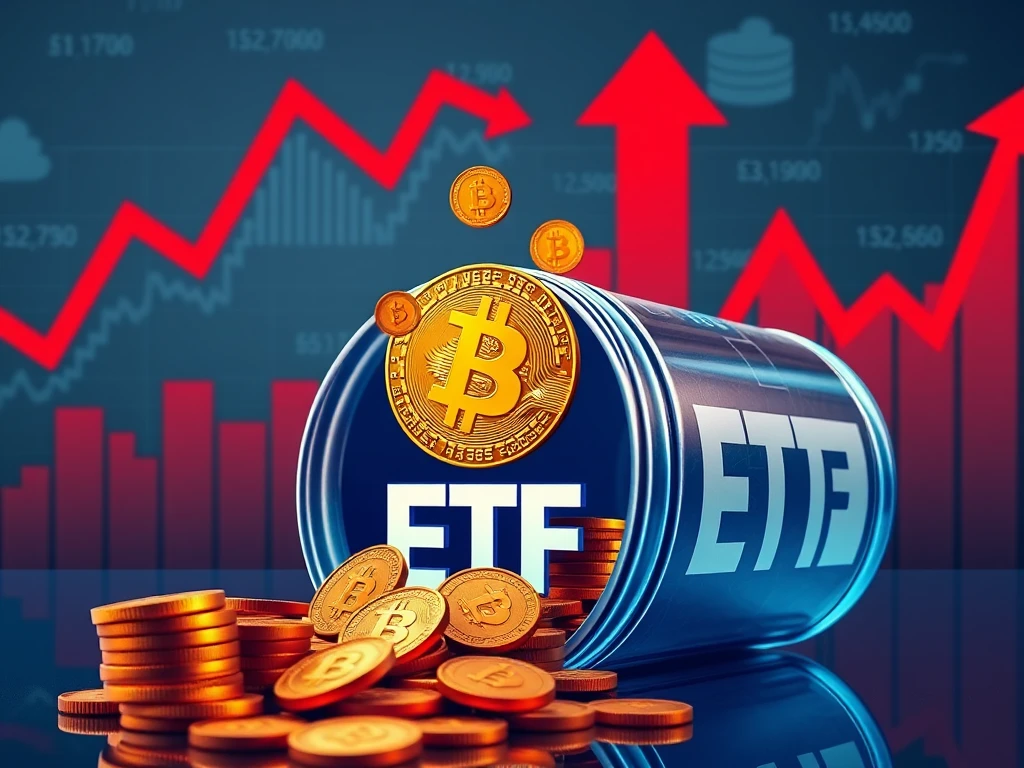Shocking $772M Bitcoin ETF Outflow: Tariff-Driven Inflation Triggers Investor Panic

Hold onto your hats, crypto enthusiasts! The Bitcoin ETF honeymoon might be over, at least for now. We’re witnessing a dramatic exodus from spot Bitcoin ETFs, with a jaw-dropping $772 million outflow. What’s fueling this sudden investor retreat? The culprit seems to be growing anxiety over tariff-driven inflation and its potential domino effect on the global economy. Let’s dive deep into what’s happening and what it means for Bitcoin and the broader crypto market.
Why Are Bitcoin ETF Outflows Surging? Tariff-Driven Inflation Fears Take Center Stage
Recent data reveals a concerning trend: spot Bitcoin ETFs are experiencing significant pressure. Between March 28 and April 8, these ETFs saw a massive $595 million in net outflows, according to Farside Investors. Even the temporary lifting of US import tariffs on April 9th offered no respite, with an additional $127 million fleeing the funds. This raises a critical question: why are investors pulling back even after Bitcoin’s price briefly touched $82,000 on April 9th?
The answer appears to lie in the shadows of a looming economic threat – tariff-driven inflation. The recently implemented US tariffs on multiple countries are sparking fears of increased inflation. Investors are worried that these tariffs will lead to higher prices for goods and services, eroding purchasing power and potentially triggering a broader economic downturn. This fear is prompting a shift towards safer assets, impacting even the seemingly unstoppable Bitcoin ETF.
Credit Risk Concerns: Another Blow to Bitcoin ETF Confidence?
Beyond inflation, another significant factor spooking investors is the escalating credit risk. Experts like Michael Weidner from Lazard Asset Management point to a concerning drying up of liquidity in the credit market. This suggests a rising probability of an economic slowdown or even a recession.
In times of economic uncertainty, investors typically flock to safer havens. These include:
- Government Bonds: Considered low-risk investments, especially in developed nations.
- Cash Holdings: Provides immediate liquidity and avoids market volatility.
This “flight to safety” is diverting funds away from riskier assets like Bitcoin and into these more traditional, secure options. The potential for a credit crunch – a severe restriction in loan availability – further amplifies these concerns. Even potential interest rate cuts by the Federal Reserve might offer only temporary relief if businesses and consumers face difficulty accessing credit.
Corporate Bonds Under Pressure: A Red Flag for the Economy?
The unease in the market is clearly reflected in the corporate bonds sector. Despite relatively stable US Treasury yields, investor appetite for corporate debt remains weak. Data from the ICE Bank of America Corporate Index shows widening corporate bond spreads. Dan Krieter from BMO Capital Markets highlights that corporate bond spreads have widened at the fastest pace in a week since the March 2023 regional banking crisis.
What are corporate bond spreads? They represent the difference in interest rates between corporate bonds and government bonds. A wider spread indicates higher perceived risk in lending to companies. This widening spread signals that investors are becoming increasingly wary of corporate debt, reflecting broader economic anxieties.
Economic Recession Fears Dampen Enthusiasm Despite CPI Data
Interestingly, even positive economic news like the March US Consumer Price Index (CPI) – which showed the slowest annual increase in four years at 2.8% – failed to boost market confidence. This is because, as RSM chief economist Joe Brusuelas explains, this CPI figure is likely the calm before the storm of tariff-driven inflation.
Investors are seemingly bracing for the impact of tariffs and anticipating that future inflation figures will be less favorable. This anticipation is overriding any positive sentiment from the latest CPI data and contributing to the risk-off approach in the market, impacting Bitcoin ETFs negatively.
Will Bitcoin’s Unique Value Proposition Break Through?
Traders are seemingly waiting for the corporate bond market to stabilize before regaining confidence in Bitcoin ETF inflows. As long as economic recession risks linger and concerns about tariff-driven inflation persist, the trend of investors favoring safer assets is likely to continue.
For Bitcoin to reverse this trend and decouple from traditional market sentiment, a significant shift in perception is needed. Investors need to recognize and prioritize Bitcoin’s unique attributes:
- Fixed Monetary Policy: Bitcoin’s capped supply of 21 million coins offers a hedge against inflation in the long term.
- Censorship Resistance: Bitcoin’s decentralized nature provides financial freedom and protection against government or institutional control.
However, catalysts for such a perception shift remain unclear and may take considerable time to materialize. For now, the Bitcoin ETF market appears to be navigating turbulent waters, heavily influenced by macroeconomic headwinds and investor anxieties surrounding tariff-driven inflation, credit risk, and the looming threat of an economic recession.
Disclaimer: This article is for informational purposes only and not financial advice. Conduct thorough research before making any investment decisions.









